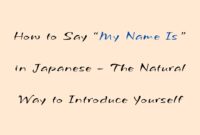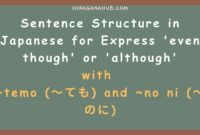Understanding “Masenka”
The expression “masenka” is a polite way to invite or
suggest doing something together in Japanese. It’s commonly used in
daily conversations to ask, “Shall we?” or “Won’t you?” in a
respectful and friendly tone.
This structure is particularly useful for social interactions, whether
you’re inviting someone for a meal, to head home together, or to go
somewhere.

Sentence Pattern:
“いっしょに (Issho ni) + Noun + Particle + Verb ませんか (Masenka)”
The pattern “issho ni + noun + particle + verb masenka” is used to ask
someone to join in an activity.
It’s simple, versatile, and perfect for learners at any level. Let’s
explore some examples below.
Example Sentences
-
いっしょにばんごはんをたべませんか?
Issho ni bangohan o tabemasenka?
Won’t you have dinner together? -
いっしょにかえりませんか?
Issho ni kaerimasenka?
Shall we go home together? -
いっしょにがっこうへいきませんか?
Issho ni gakkou e ikimasenka?
Shall we go to school together?
Vocabulary List
| Kanji | Hiragana | Romaji | Meaning |
|---|---|---|---|
| 一緒 | いっしょ | Issho | Together |
| 晩ご飯 | ばんごはん | Bangohan | Dinner |
| 帰る | かえる | Kaeru | Return/Go home |
| 学校 | がっこう | Gakkou | School |
| 行く | いく | Iku | Go |
| 食べる | たべる | Taberu | Eat |
| ませんか | ませんか | Masenka | Shall we?/Won’t you? |
| へ | へ | E | To (directional) |
| を | を | O | Object marker |
How to Use “Masenka” in Daily Life
This polite expression is ideal for inviting friends, family, or
colleagues to join you. Whether you’re planning an outing or
suggesting a shared activity, “masenka” helps you
express your invitation respectfully.
For instance:
-
Use “issho ni bangohan o tabemasenka” when inviting
someone to dinner. -
Use “issho ni kaerimasenka” when suggesting going
home together.
This polite phrase ensures you sound friendly and considerate.
Tips for Practicing “Masenka”
-
Use it in Conversations
Practice with a
friend by making polite invitations in Japanese. -
Combine with New Vocabulary
Expand your
sentences with new words like “park” (公園, kouen) or “movie”
(映画, eiga). -
Write and Speak
Write example sentences and
say them out loud to enhance retention.
Common Situations for “Masenka”
-
Invitations
Perfect for casual or formal
invites, such as grabbing a coffee or attending a meeting. -
Suggestions
Use “masenka” to gently propose
an idea.
By mastering this phrase, you’ll build confidence in initiating social
interactions.
Practice Exercise
Translate these sentences into Japanese using
“masenka”:
- Shall we watch a movie together?
- Won’t you play tennis with me?
- Shall we go shopping?
Importance of Learning “Masenka”
Understanding “masenka” unlocks a key part of
Japanese conversation. It enables you to express politeness while
making invitations or suggestions.
Through online courses, you can find free lessons to dive deeper into
Japanese grammar and vocabulary.
By consistently using “masenka,” you’ll enhance your ability to
communicate effectively and naturally in Japanese.
Learning polite expressions like “masenka” enriches
your language skills. Explore free online resources and courses to
improve your understanding of Japanese grammar and culture.
Happy learning, and don’t forget to practice!


